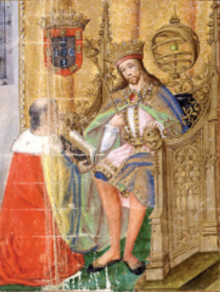Rui de Pina
| Rui de Pina | |
|---|---|

Rui de Pina presents King Manuel I with his Chronicle of King Edward, c. 1497-1504.
|
|
| Born | 1440 Guarda, Portugal |
| Died | 1521 (aged 81) Lisbon, Portugal |
| Nationality | Portuguese |
| Occupation | Chronicler |
Rui (or Ruy) de Pina (1440–1521) was a Portuguese chronicler.
Rui (or Ruy) de Pina was a native of Guarda. He acted as secretary of the embassy sent by King John II of Portugal to Castile in the spring of 1482, and in the following September returned there as sole envoy. He was present at the execution of Fernando II, Duke of Braganza at Évora in 1483, and in 1484 went to Rome as secretary of an embassy to Pope Innocent VIII. Upon his return, the king charged him to write a history of his reign and gave him a pension for his support.
Following the return of Christopher Columbus from his first voyage in 1493, Pina was one of the commissaries dispatched to Barcelona by John II to negotiate with the Catholic sovereigns respecting the limits of their respective jurisdictions, that would culminate in the Treaty of Tordesillas in 1494. In September 1495 he attested the will of John II in his capacity as a notary public, and on the 25th of October of the same year he was present at his master's death at Alvor and opened and read his testament.
The new king, Manuel I, confirmed his pension and in 1497 appointed him high chronicler (cronista-mor) of the kingdom, keeper of the archives of Torre do Tombo and royal librarian, with a suitable salary. By 1504 Rui de Pina had completed his chronicles of Afonso V and John II. In 1521, King John III charged him with a history of his father, Manuel, and at his death Pina had carried it down to the capture of Azamor, as we know from Damião de Góis, who used it in preparing his own chronicle of that monarch.
...
Wikipedia
